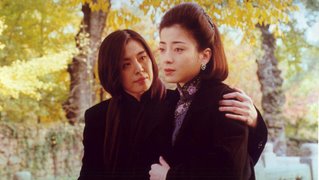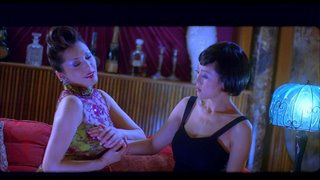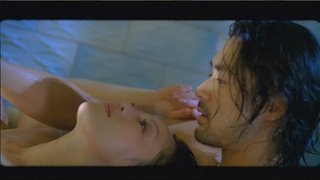



Master of Beauty and Desires
--A Retrospective of Hong Kong master Yonfan and his new movie “Colour Blossoms”
By Andrew C.C. Huang
(This article originally appeared in Taiwan News on August 12, 2005)
Everyone knows about the desire for beauty and the disappointment in the loss of it. Invariably, filmmakers all over the world all make their careers out of exploring their desires and disappointments – for what else matters the most in this world besides love?
If Hong Kong master Wong Kar Wai is torn between the intrigues of romance and unrequited love while Taiwan auteur Tsai Ming-liang is irrevocably fixated with the allures of human bodies and sexuality, then Hong Kong director Yonfan willingly and gleefully swims in the river of beauty and its enchantment.
This week, Yonfan’s highly controversial and extremely erotic movie “Colour Blossoms” will make its Taiwan premier at Taipei’s Spot Cinema under the festival entitled “Music in Taiwan and Mandarin Films: A Companionship.” The festival runs from August 12 until September 29. Three of Yonfan’s movies, including the erotic fantasy “Colour Blossoms,” costume drama “Peony Pavilion” and docudrama “Breaking the Willow” will be featured in the festival.
“Colour Blossoms” recounts the story of a young real estate agent (portrayed by Teresa Cheung, the prodigally squandering ex-wife of Hong Kong singer/actor Kenny Bee and the tabloid queen known for her socialite antics) who struggles between her love for a impeccably handsome photographer and a shy but equally gorgeous cop when she takes on the rental management duty of a luxurious apartment owned by a wealthy Japanese Madam.
While Yonfan’s pervious movies explored the topics of sexuality and human longings, he pushes the envelop further this time by tackling erotic sexual scenes, sadomasochistic games, galore of shots featuring beautiful actors and actress’ skin and, last but not least, a subtle contemplation and questioning of the meanings of fantasy, sex and love.
Because of the risqué subject matter of the movie and the involvement of the controversial personality Teresa Cheung, the project had an unusually difficult production process because it was spurned by most of the talents and investment firms invited by Yonfan even with his the shining brand name.
In addition, the nudity scenes presented enormous challenges for the movie’s two first-time actors -- namely Teresa Cheung and Japanese model Sho. During the difficult shooting that dragged on for more than 13 months because of financing troubles, both Cheung and Sho experienced major emotional hurdles performing their nudity scenes. Once, Cheung cried for two days after shooting a sexual scene. A concerned Yonfan asked Cheung if she could stick it through. A notorious personality known as much for her excess and strength, Cheung answered, “Yes, I can do it. I just need to let my emotions out. You put your trust in me by casting me. I will finish this movie no matter what.”
When “Colour Blossoms” released in Hong Kong last year, it was greeted with pervasive ridicules and was labeled as pornography. However, this finely crafted movie won its due respect it was invited to be screened at Berlin Film Festival this year. “Colour Blossoms” also eventually won the Film of Merit award from Hong Kong Film Critics Society this year.
No stranger to awards, Yonfan’s 2001 lesbian costume romance “Peony Pavilion” won the FIPRESCI Prize at Moscow Film Festival and sent the movie’s participating Japanese actress Rie Miyazawa to the Best Actress award glory at the festival. In October 2003, Yonfan was acknowledged again for his cinematic excellence with a “Yonfan Trilogy” Film Festival held in Guimet Museum in France.
All these accolades might not be so surprising if Yonfan is not tackling risqué subject matters in his films – homosexuality, transvestite, sadomasochistic romance and prostitution.
A true-to-his-heart artist, Yonfan does not treat these subject matters with any sensationalism or shock values. Rather, he gently tells us the stories and emotions about these characters – be they homosexual, transvestite, prostitute or the sexually confused.
“Colour Blossoms” marks the first time Yonfan makes the foray into the so called sexually explicit and consciously controversial movie. The movie’s subject matters of sexual fantasy and sadomasochistic relationship made the project a magnet for sneering and mockery by the media and the public before and during the movie’s shooting and even after the Hong Kong release.
"Colour Blossoms" is a further development from Yonfan's risky but critically acclaimed so-called “Yonfan Trilogy,” which includes "Bugis Street," "Beauty" and "Peony Pavilion." In the small-budget 1995 film "Bugis Street," Yonfan paints a sympathetic and touching portrait of a group of transvestite prostitutes who make their living by conning sailors into their brothel house when they are drunk. The success of “The Burgis Street” paved way for a bigger budget gay romance “Beauty” in 1998. In this sumptuous project of passion, a Hong Kong young policeman from a conservative family discovers his homosexuality through the experience of falling in love with a budding pop star before the singer achieves his fame. The exploration of this subject matter culminated in “Peony Pavilion,”a lavish costume drama set in early Republic China about the love triangle between a male teacher, a bisexual female teacher and her lesbian lover.
Yonfan’s obsession with human beauty is apparent in his choices of actors. He prefers to choose beautiful and photogenic actors even if they are new comers or stars known more for their charisma rather than acting chops. However, with Yonfan’s acute sensitivity, he is able to draw out the best of his actors and elevate their acting caliber. With “Beauty,” Yonfan uses four new actors including Daniel Wu (who went on to win the Best Supporting Actor Award at Golden Horse last year for Jackie Chan’s “New Police Story”), the ravishingly handsome Terence Yin, Stephen Fung and a young Shu Qi (who successfully transforms herself from a star to an actress in Taiwan master Hou Hsiao-hsien’s “The Millennium Mambo” and then in this year’s Cannes competition film “Best Years”). With “Peony Pavilion,” Yonfan pairs up Taiwan superstar Joey Wong of the celebrated “A Chinese Ghost Story” trilogy fame and Japanese superstar Rie Miyazawa as a lesbian couple in a nostalgic and lavish end-of-aristocracy era love tale. Wong, who is as known for her shockingly celestial beauty as for her one-note facial expression, manages to deliver the most touching performance of her career under Yonfan’s tutelage. Miyazawa, on the other hand, went on to claim the glory of a heavyweight best actress award at the Moscow Film Festival.
While these heart-felt, poignant movies about people who live on the margin of the society and are torn apart by the society’s decorum of forbidden love move the hearts of critics and audiences, their fruition did not come easy. Yonfan started his career as a commercial director specializing in sentimental romance movies. The success of a long string of commercial romance movies finally afford Yonfan the clout to embark on his own personal journey and explore the topics that’s closer to his heart as an art-house auteur.
Born in 1952 in Hunan Province in China, Yonfan immigrated to Hong Kong during his youth. Fascinated with beauty since youth, Yonfan picked up his camera to photographs different objects and quickly landed a job as a photographer.
His unwavering sense of capturing the beautiful aspects of all things was quickly noticed by Hong Kong’s movie industry – an industry that specializes in selling dreams and stars’ charisma for audience’s escapism enjoyment. He moved up to become a cinematographer and soon had enough clout to become a director.
Yonfan’s early phase as a commercial director saw him directing several romances back to back. His first success is the 1985 romance blockbuster “The Story of Rose” starring a young Chow Yun Fat and Maggie Cheung. In the movie, Cheung portrays the title role of a girl named Rose who lost her beloved brother (portrayed by Chow) and then ten years later marries a man (Chow again) who is a dead-ringer of her brother only to lose him again in a car crash. This classic features the young but already a thespian actor Chow in a rare dual role. The young Cheung, whose acting skill is hugely overshadowed by her fame and Miss Hong Kong title back then, also delivers a touching performance as Rose that foreshadows her future success.
Riding on the momentum, Yonfan went on to make another romance “The Flower Floating on the Sea” in 1986 starring superstar Sylvia Chang as a prostitute who falls in love with a soldier. In 1987, Yonfan reinterpreted Alfred Hitchcock’s classic “Vertigo” into a thriller romance entitled “Double Fixation” starring 80’s reigning sex goddess Cherie Chung Chu Hong as a mysterious beauty who captures the heart of a office man played by Hong Kong pop star Jacky Cheung. Under Yonfan’s adroit direction, the already astonishingly beautiful Chung literally becomes Venice reincarnated with an endless array of lavish gowns and delicate dresses that show off her through-the-ceiling sexual wattage.
In 1988, Yonfan pairs up the two female reigning superstars Cherie Chung and Maggie Cheung in another romance movie “Golden Years” with Chung and Cheung as two childhood best friends who move into drastically different paths in life.
In 1994, superstar Maggie Cheung again returns to collaborate with Yonfan to star as a single woman looking for love in a three-part movie entitled “The New Age of Living Together.” By 1994, Cheung has already established herself as the unrivalled award-winning queen by raking up the best actress award at Golden Horse Awards for “Full Moon in New York” in 1989, the best actress award in Hong Kong Oscars for “A Fishy Story” in 1989, and three best actress awards at Golden Horse Awards, Hong Kong Oscars and then at Berlin Film Festival for “The Actress” in 1992.
“I feel safe in the hands of Yonfan,” Maggie Cheung has once said. “I know that no matter what, he will always capture the most beautiful sides of me and show me at my best.”
Yonfan’s esthetic is extreme, lavish, elegant, and almost nihilistic. His pursuit of the human beauty ideal is unflinching and reckless. China master Zhang Yimou explores the darkness and the decadence of the corrupted old China underneath his beautiful cinematography. Hong Kong master Wong Kar Wai contemplates the sadness of lost love and yearning with the aid of Christopher Doyle’s gorgeous cinematography and William Chang’s art design. By comparison, Yonfan projects his highly polished sense of esthetics into the characters and the humanity itself. Ever an optimist who holds the religion of beauty and ideals, Yonfan’s movies are almost devoid of villainous characters. Even though most of his romance movies take the final note with tragic endings, the nature of these tragedies are never dark. His characters are ordinary or beautiful human beings driven by desires and yearnings to pursue their ideals out of good intentions. In his cinematic universe, fate is the force that tears the beautiful lovers apart and leaves their love unconsummated.
However, as the old saying goes, beauty exists in the eyes of the beholders. With Yonfan’s unerring eyes and magical cinematic touches, even marginalized personalities such as homosexuals, transvestites, transsexuals, the sexually confused and aging divas all put on their invisible cape of glamour and become beautiful objects of desire.
Maybe Yonfan is right after all. In his early 1984 small-budget film “Diary of a Young Girl,” a young girl having a crush on her physical education teacher learns the pain and pleasure of love. As this small movie foretells and continue to asserts, there is no villain and devil in this world. There is only coveted beauty and the forlornness or hatred of desires gone unfulfilled.
(“Colour Blossoms” is shown with both Chinese and English subtitles. Screenings for “Music in Taiwan and Mandarin Films: A Companion” film festival will be held in Taipei, Taoyuan, Hsinchu and Kaohsiung. For ticket and schedule info, please contact Spot Cinema at (02) 2511-7786 or check out www.artstikcet.com.tw )

Comments